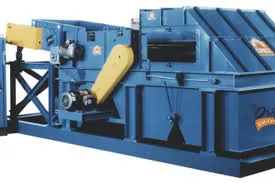

dec . 05, 2024 15:14 Back to list
The Role of Large Industrial Shredders in Modern Waste Management
In an age where sustainability and efficient waste management are paramount, large industrial shredders play an indispensable role across various industries. These powerful machines are engineered to handle an extensive range of materials, significantly aiding in the reduction of waste, resource recovery, and promoting an eco-friendly environment.
What is a Large Industrial Shredder?
A large industrial shredder is a heavy-duty piece of equipment designed to shred, crush, or tear down large volumes of material into smaller, more manageable pieces. The materials processed can include plastic, rubber, wood, paper, metals, and even electronic waste. These shredders are essential for businesses dealing with substantial amounts of waste and are pivotal in recycling operations, industrial manufacturing, and waste management facilities.
Functionality and Design
The design of a large industrial shredder is robust and tailored to withstand extreme conditions. Typically, they consist of sharp rotating blades that are capable of cutting through dense and tough materials. The size of the output can often be customized based on the intended application, with the shredded material being reduced to specific dimensions to facilitate further processing.
The use of advanced technology in these shredders enhances their efficiency and effectiveness. Features such as automatic feed systems, adjustable blade settings, and emission control systems ensure that they operate optimally, minimizing downtime and maximizing throughput. Moreover, modern shredders are equipped with smart technology, which allows for remote monitoring and control, further optimizing their function in real-time.
Benefits of Large Industrial Shredders
1. Waste Reduction One of the most significant advantages of using industrial shredders is their ability to reduce the volume of waste. By shredding materials into smaller sizes, companies can significantly decrease the amount of space needed for waste storage and transport.

2. Resource Recovery Shredders facilitate the recycling process. For instance, shredded paper can be easily processed into new products, and metals can be sorted and processed for reuse. This aligns with the circular economy model, which emphasizes the importance of reusing materials and reducing landfill dependency.
3. Safety Proper waste management with industrial shredders helps to minimize hazards associated with large, bulky materials. By shredding potentially hazardous materials into manageable sizes, workplaces can ensure a safer environment for employees and reduce the risk of accidents associated with improperly handled waste.
4. Cost-Efficiency Although the initial investment in a large industrial shredder can be significant, the long-term savings are considerable. By reducing waste hauling costs and optimizing recycling processes, companies can recover their investments while improving their bottom lines.
Applications Across Industries
Large industrial shredders find applications in various sectors, including manufacturing, construction, waste management, and recycling. In manufacturing, they are used to shred excess materials like plastic, textiles, and metal scrap, effectively minimizing waste. Construction sites utilize these machines to break down demolition debris, while electronic waste facilities rely on industrial shredders to safely dispose of outdated electronics, recovering valuable materials in the process.
In the waste management sector, these shredders contribute to landfill diversion strategies. By processing waste into smaller particles, they help enhance the efficiency of waste separation and resource recovery processes, significantly contributing to environmental goals.
Conclusion
As industries continue to grapple with the challenges of waste management, large industrial shredders emerge as critical tools for promoting sustainability and efficient resource recovery. Their ability to reduce waste volume, enhance recycling processes, and ensure workplace safety underscores their importance in modern industrial operations. Investing in such technology not only aids in compliance with environmental regulations but also fosters a commitment to a greener, more sustainable future.
Latest news
Troubleshooting Common Eddy Separator Problems
NewsJul.04,2025
The Role of Metal Recycling Plants in Circular Economy
NewsJul.04,2025
The Impact of Recycling Line Pickers on Waste Management Costs
NewsJul.04,2025
Safety Features Every Metal Shredder Should Have
NewsJul.04,2025
How Industrial Shredders Improve Waste Management Systems
NewsJul.04,2025
How Cable Granulators Contribute to Sustainable Recycling
NewsJul.04,2025